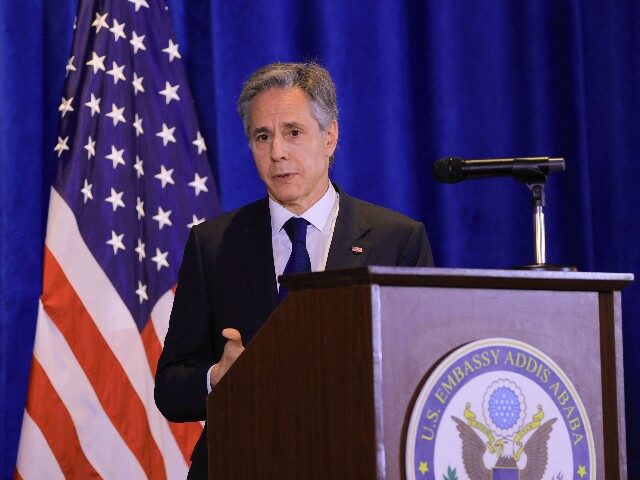Secretary of State Antony Blinken lamented in remarks to Ethiopian press this week that America was “insufficiently vocal” about past human rights abuses in the country, appearing to apologize for the events that preceded the 2020 civil war in that country.
Hostilities in the Ethiopian war – which became an international conflict in 2022 when reports surfaced of Eritrea sending its soldiers into the blockaded Tigray region – erupted in late 2020 as a result of attacks on government facilities by the Tigray People’s Liberation Front (TPLF). The TPLF is a Marxist political party with a militia wing that was once the ruling party in the country. Current Prime Minister Abiy Ahmed, a Nobel Peace Prize winner, outlawed the TPLF and designated it a terrorist organization, launching full-scale military hostilities not just against the TPLF, but the entirety of the TPLF region.
Abiy mobilized to blockade Tigray, home to the minority Tigrayan ethnic group, and prevent the entry of food and vital medicines, prompting a massive humanitarian crisis many human rights experts designated a genocide, or, less formally, an act of ethnic cleansing. Blinken himself described the events in Tigray as “ethnic cleansing” in 2021, though he did not use similar language while in Addis Ababa this week.
The Nobel Prize Committee has not moved to rescind Abiy’s peace prize despite accusations of ethnic cleansing, his presence on the front lines of the conflict, or incendiary remarks vowing to “bury this enemy with our blood and bones and make the glory of Ethiopia high again.”
The TPLF has also been accused of rampant human rights atrocities, particularly raids against Amharic villages featuring mass killings and the rape of a significant percentage of women and girls in affected communities. Abiy is a member of the plurality Oromo ethnic group.
The two sides of the Ethiopian war agreed to a truce in November, largely ending active hostilities. Some humanitarian aid is returning to Tigray, but activists say it is not arriving quickly enough given the devastation caused by the blockade. The war is believed to have taken hundreds of thousands of lives. Reports also continue to surface throughout Ethiopia of atrocities – including killings and rape – of civilians by both sides of the war.
Blinken is currently concluding a visit to Africa, including stops in both Ethiopia and Niger. In Addis Ababa, Blinken announced that the administration of far-left President Joe Biden will gift Ethiopia “an additional $331 million in emergency food and humanitarian assistance that will reach millions of people, millions of Ethiopians affected by conflict, affected by drought.” He did not specify if that money would go directly to Abiy’s government.
Blinken met with Abiy during his time in the country, committing Washington to “revitaliz[ing] our strong partnership”:
During a press conference on Wednesday, Blinken applauded Abiy and the TPLF for agreeing to cease hostilities in November.
“Prime Minister Abiy and the Ethiopian federal government and Tigrayan regional leaders should be commended for reaching this agreement and the significant progress in delivering on their commitments,” Blinken said. “These efforts have created the foundation to rebuild the communities that have suffered so in Tigray, Amhara, and the Afar regions. They need the help and support.”
Blinken encouraged both sides to admit to their “atrocities and their devastating consequences” in the war. In an apparent attempt to lead on that effort, Blinken seemed to apologize on behalf of the United States for the TPLF-Abiy conflict.
“For our part, the United States acknowledges the human rights violations and repression committed during the past three decades – actions which sowed the seeds of future conflict,” Blinken said. “We and others were insufficiently vocal about those abuses in the past.”
The left-wing New York Times interpreted Blinken’s statement as attributing “historical responsibility for Ethiopia’s civil strife” to America.
“Recognizing the atrocities committed by all parties is an essential step to achieving a sustainable peace,” Blinken continued. “We urge Ethiopians to follow through on their commitments to each other to implement an inclusive and comprehensive transitional justice process that includes both reconciliation and accountability.”
“Overcoming poisonous grievances and ethnic divisions is the only way to break the cycle of political and ethnic violence in the north, in Oromia, or anywhere else. As a partner in that effort, the United States is providing both technical and financial support,” he concluded:
Blinken did not provide a direct answer to a question regarding Washington’s previous description of the conflict as “ethnic cleansing” or any investigation into declaring the Tigray blockade a genocide. Asked about ongoing reports of human rights abuses after November, including widespread mass rapes of civilians, Blinken said, “By and large the guns are silent, humanitarian assistance is flowing, services are being restored.”
Blinken claimed “a very significant drop in human rights violations and abuses in Tigray” had occurred.
“That doesn’t mean that they’ve been eliminated, and indeed, we are – we strongly urge all parties to the conflict to do everything possible to ensure that they cease entirely,” he added, “But again, we’ve seen what was described to me by independent experts as a very significant diminution in human rights violations.”
Follow Frances Martel on Facebook and Twitter.

COMMENTS
Please let us know if you're having issues with commenting.